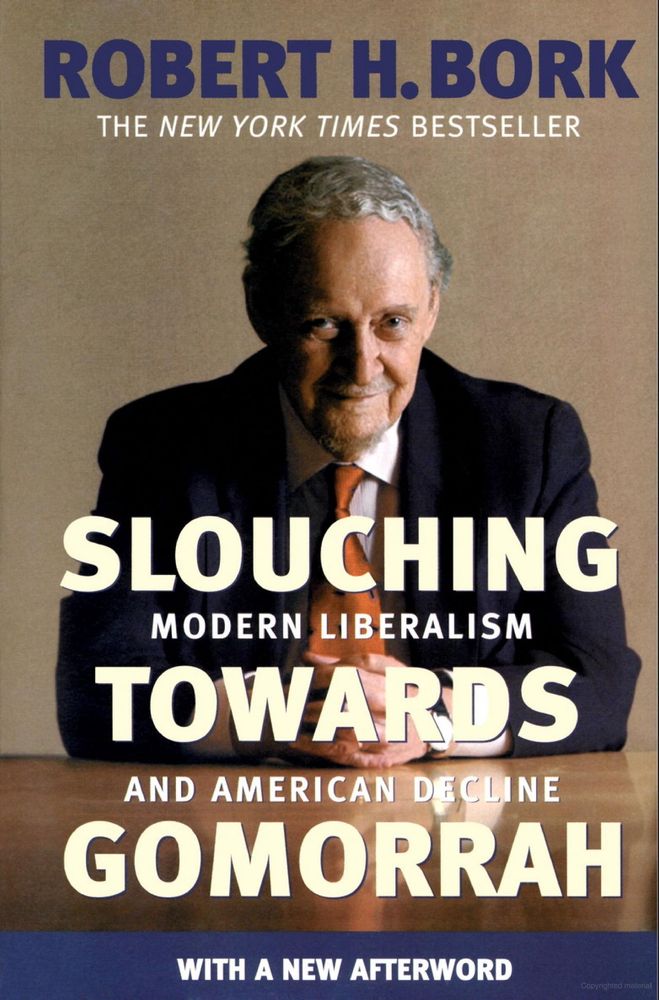Accountability removal machine

Apparently, uncomfortable-with-Trump conservative pundits have gotten board with “Republicans had to go fash because Obama didn’t just let Romney win” and have gone back to “Republicans had to go fash because a bipartisan majority defeated Robert Bork based on his publicly stated views”:
if democrats just would have let republicans put one criminal hatchet man on the court, republicans nearly 40 years later would not have put this criminal hatchet man on a court
[image or embed]— jamelle (@jamellebouie.net) Aug 13, 2025 at 10:30 AM
In response to the negative (and correct) feedback, Nichols cited even-the-liberal Joe Nocera trying to sell this already well-worn bullshit, so I guess I can just cite what I said at the time:
Senate obstructionism is a legitimate problem – the fact that it is difficult to get not only federal judges confirmed is a real problem for American government. But the claim that the defeat of Bork was “obstructionist” is transparently wrong. The Democratic majority scheduled Bork’s confirmation hearings in a timely manner and allowed an up-or-down vote. Bork was not (unlike LBJ’s Supreme Court nominee Abe Fortas) filibustered or left in limbo — he was defeated fair and square by a bipartisan 58-42 vote in the Senate after getting only 5 out of 16 votes from the Senate Judiciary Committee. The charge of obstructionism also implies that the Democrats were unwilling to confirm anyone, but the more moderate conservative Anthony Kennedy was subsequently confirmed by the Senate by the razor-thin margin of 97-0.
Nocera, like many Bork apologists, argues that the Senate acted unfairly by considering Bork’s ideology as well as his basic qualifications (which were clearly sufficient.) But for the Senate to consider a nominee’s philosophy was neither unprecedented nor unreasonable. For example, Herbert Hoover’s nomination of John Parker was rejected in 1930 largely because of concerns about his civil rights record. And to argue that the Senate should concern itself solely with formal qualifications at the same time that President Reagan was systematically packing the federal judiciary with young conservatives is absurd.
Robert Bork was nominated in large measure because of his impeccably conservative track record; it’s not clear why the Senate shouldn’t be able to evaluate him on this basis.
So the defeat of the Bork nomination wasn’t obstructionist. But was the criticism of him unfair or excessively harsh? Like most Bork apologists, Nocera cites a speech made by Senator Ted Kennedy after his nomination was announced, in which he said that “Robert Bork’s America is a land in which women would be forced into back-alley abortions, blacks would sit at segregated lunch counters, rogue police could break down citizens’ doors in midnight raids, schoolchildren could not be taught about evolution, writers and artists would be censored at the whim of government, and the doors of the federal courts would be shut on the fingers of millions of citizens for whom the judiciary is often the only protector of the individual rights that are the heart of our democracy.”
Nocera is typical in that he quotes Kennedy as if his comments were self-evidently dishonest, without bothering to cite anything in the speech that was factually wrong. This is understandable because everything in Kennedy’s speech was based on Bork’s public writings. Bork did write an article for the New Republic denouncing the Civil Rights Act as unconstitutional and “based on a principle of unsurpassed ugliness.” (Nor was Bork’s opposition to the Civil Rights Act purely an academic exercise; according to Rick Perlstein’s Before the Storm, Bork was instrumental in convincing Republican presidential candidate Barry Goldwater to oppose it.) Bork was a critic of the exclusionary rule – which prevents the state from profiting from illegal searches and hence inhibits them. He wrote a widely discussed article in 1971 that the free speech clauses of the First Amendment should “not cover scientific, educational, commercial or literary expressions as such.” He was a long-standing critic not only of Roe v. Wade but the right to privacy in general, and whether opponents of reproductive rights wish to acknowledge it or not bans on abortion lead to women getting maimed or killed by back-alley abortions.
Kennedy’s speech was powerful because it was substantially accurate. Reagan nominating someone who believed that the Civil Rights Act was unconstitutional and that the First Amendment doesn’t protect literature doesn’t show how Democrats made the Republicans nominate Trump three times, it shows how much continuity there has always been between Reaganism and Trumpism.
And this isn’t the only continuity between Bork and Trumpism:
The arc of history is long but it bends all the way to a Supreme Court controlled by foaming ideologues like Robert Bork AND a Justice Department controlled by lawless goons like Robert Bork; this is all the fault of liberals, not of the patrons, friends, and allies of Robert Bork
[image or embed]— Tom Scocca (@tomscocca.bsky.social) Aug 13, 2025 at 8:12 PM
Bork being confirmed wouldn’t have changed the trajectory of the Republican Party at all, it just would have produced even worse outcomes from the Supreme Court.


